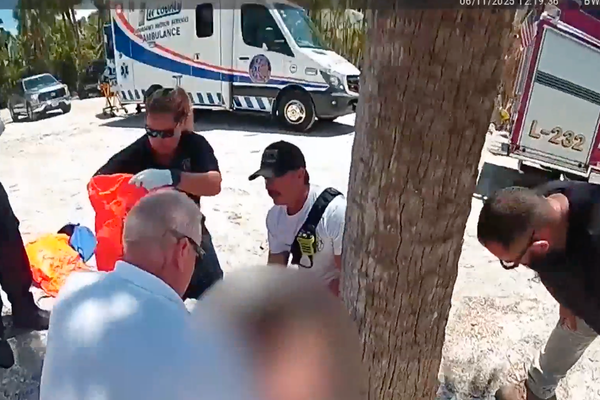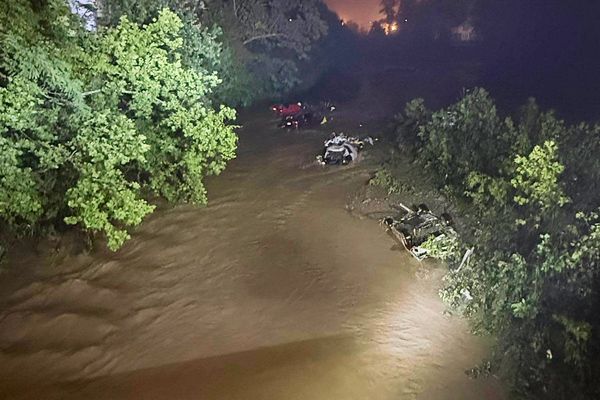When journalist Guy Lawson sold the movie rights to his 2011 Rolling Stone article about two Miami Beach stoners who landed a $300 million contract with the Pentagon, he envisioned the resulting film would be a serious expose.
"I wanted a documentary that focused on Pentagon malfeasance, corruption in Albania and the arbitrary nature of justice _ how the U.S. government spent resources on a case that was really just a big publicity stunt," he says. "But how many people do you think would go see that movie?"
Instead, "War Dogs," which opens Friday, became a Hollywood studio production with famous actors and a director, Todd Phillips, best known for the "Hangover" trilogy.
But even though distributor Warner Bros. is emphasizing the broad humor of "War Dogs" in its marketing, the film is something new and more ambitious for Phillips _ a sober drama that critiques misguided ambition, high-level government corruption and the destructive nature of greed. The movie just happens to be hilarious, too.
Arriving near the end of a summer season that's been heavy on big-budget duds, "War Dogs" stands out for its contemporary real-world subject matter, lack of special effects and its narrative integrity. Phillips, who also co-wrote the screenplay with Stephen Chin and Jason Smilovic, has managed to push a movie that bears a distinct authorial stamp through a Hollywood studio system that increasingly subjects films to creative decisions made by committees.
One of the reasons he was able to do that is he has a longstanding relationship with Warner Bros. Another is that "War Dogs" didn't cost $175 million, like the studio's much-maligned "Suicide Squad" did.
"I haven't seen 'Suicide Squad,' but when you get into spending that kind of money, there are going to be a lot of cooks in the kitchen, because there's a big bet on the line and people want to make sure they're covered," Phillips says. "I understand that argument from both sides. I just choose to work on a smaller scale. If we keep the budget down _ and again, everything's relative, so down in Hollywood is still a large number to most people _ you can tell the story you want to tell.
"'War Dogs' is not the kind of movie studios will automatically want to make in the current climate of sequels and superhero movies," he says. "But I've built a nice amount of good will with Warner Bros. I made four movies for them in five years (the 'Hangover' trilogy and 'Due Date') and they all made a good amount of money. The thing about Hollywood is good will is perishable. You have to use it, because it doesn't always stick around. So that's how I got to make 'War Dogs.' It felt like a nice evolution in my career and tonally it isn't that far off from what I normally do."
BAD BEHAVIOR
Phillips began his career making documentaries, including 1993's "Hated: GG Allin and the Murder Junkies" and 1998's "Frat House", before finding his groove with R-rated comedies (he produced "Project X", the critically underrated ode to adolescent anarchy). The theme of men behaving badly recurs through his work. The difference in "War Dogs" is that the mayhem drives its protagonists apart instead of bringing them together, as it did in "Road Trip" and "Old School."
Jonah Hill and Miles Teller play Efraim Diveroli and David Packouz, two pals from Miami Beach's Beth Israel Congregation synagogue who made the front page of the New York Times in 2008. The article reported that they had illegally sold millions of rounds of Chinese AK-47 ammunition to the U.S. government, to be used to supply Afghan soldiers waging war on the Taliban.
The actual story, which Lawson later expanded into a book, "Arms and the Dudes," was far more complicated. Lawson argues that the Pentagon, faced with a munitions shortage after long wars in Afghanistan and Iraq with no end in sight, regularly relied on the services of shady companies to secure weapons and military supplies from the international arms market, no questions asked.
Diveroli and Packouz, whose company AEY Inc. conducted business from a nondescript office space in Miami Beach, were just two of many players _ war dogs _ who took advantage of the Army's lax standards to turn a profit from military conflict without setting foot on a battlefield.
It was this aspect of the story, not the pothead-bro antics of its two improbable international arms dealers, that piqued Phillips' curiosity when he read the original Rolling Stone piece.
"My initial reaction was that I didn't believe it," Phillips says. "If it had been a short story I read in The New Yorker, I would have thought it was unbelievable and silly. So the most appealing part of it to me from the start is that this all really happened.
"But I was also interested by the bigger picture. There have been a ton of movies made about war and soldiers and patriotism. But there haven't been a ton of movies that shine a light on the small group of people that make a large amount of money from war. To me, the movie isn't an indictment of these two guys. It's an indictment of the U.S. government and their lack of oversight and their choice to look the other way when it suits them, at least until they get caught."
"War Dogs" unfolds through the eyes of Packouz, who is struggling to make a living with his girlfriend as a masseur and selling bed sheets to retirement homes when his old friend Diveroli returns from California, where he was working with his uncle. Diveroli tells him how the Bush administration, in an effort to staunch criticism of profiteering by large corporations such as Halliburton from the conflicts in Iraq and Afghanistan, had opened the bidding on military contracts. Anyone with a computer and an internet connection could bid on requests for anything from military helmets to body armor.
The two friends quickly become successful by focusing on the "crumbs" _ modest jobs involving small numbers of arms or gear the big conglomerates don't bother to bid on. Then they start getting greedy.
REWRITING A TRUE STORY
Like most Hollywood adaptations of true stories, "War Dogs" takes a lot of creative liberties, combining characters and compressing events for the sake of clarity. Bradley Cooper, for example, plays an international gun salesman who is a composite of two people. In real life, Diveroli and Packouz hung a poster from the Nicolas Cage film "Lord of War" in their office. In "War Dogs," Diveroli decorates the entire place with a "Scarface" motif.
"We're not making a documentary," Phillips says. "As long as you stay true to the vibe and spirit of what happened, you can have fun adding your own flourishes. This is not Will Smith playing Ali or Daniel Day-Lewis playing Lincoln. These are two guys who were largely anonymous to the world, so you're able to let Jonah come in and give it the swagger you want."
"I'm fascinated by stories about how people maneuver morally on their way to achieving success," says Hill. "There's one ember that lives through 'Moneyball,' 'The Wolf of Wall Street' and 'War Dogs:' They're all movies about people trying to find a way into something that is different than everyone else's approach. Sometimes it's a positive thing. Sometimes it's criminals stealing and defrauding other people. 'War Dogs' is interesting because what they did was questionable, but it was done legally, through the U.S. government. The movie leaves it up for you to decide."
Teller, who got to spend time with the real-life Packouz before filming, agrees that the protagonists of "War Dogs" can't be defined as traditional heroes and villains.
"The movie doesn't glorify what these guys did," he says. "We show the repercussions of it and how it affects David's wife and his kid. But we're not vilifying them. These guys saw an opportunity and seized it and did really well. They found this grey area the government had and just exposed a loophole. In a lot of ways you have to be impressed by what they did."
Hill, who gained weight and came up with an insidious little laugh to play Diveroli, never met his real-life counterpart, who has filed a lawsuit against Warner Bros. over "War Dogs" _ one of several lawsuits still hanging over the case.
"By all accounts, Efraim did a lot of manipulative and shady things but was still incredibly charming," Hill says. "When I talked to people who knew him, they would recount these bad things he had done to them, but then they couldn't help but smile or say 'He was fun to be around.'
"The majority of my research came from spending time in Miami, because I think Miami is a big part of the DNA of this character," Hill says. "There's a true immigrant culture there. When a lot of people from Cuba or Haiti first set foot in America, it's on the shores of Miami. The city defines their sense of the American dream. There's a real sense of 'Be on your hustle' in Miami. Efraim embodied that. Whether you use that hustle for good or bad is up to you."
SHOOTING ON LOCATION
The "War Dogs" production spent three weeks filming in South Florida in the summer of 2015. For Phillips, shooting on location was critical, since he believes there's an inherent connection between Miami's culture and the behavior of his characters.
"Someone said to me 'If you're over 35 and you live in Miami, you're up to no good!'" he says, laughing. "Obviously that's not true, but there is this kind of undercurrent there, a kind of hustler mentality that I really respect. It feels like a town _ and I mean this as the highest praise _ full of anglers and people who find loopholes and cut corners. You have to be more clever than the next guy if you live there. It made sense that David and Efraim were from there. It was one of my favorite places I've ever shot. For some reason I really fit in there."
While he was scouting locations in Miami, Phillips reached out to the real-life Packouz and asked to meet him.
Packouz, a musician who has since invented a drum machine, the BeatBuddy, and sells it through his company Singular Sound, says that after his conversation with the director, he was offered a chance to make a cameo in the film. He's the guitarist singing a Blue Oyster Cult song at a retirement home early in the film.
"I wanted to play my own stuff in that scene, but Todd was insistent on 'Don't Fear the Reaper,' because he thought it was hilarious that I would be playing that song to a group of old people," Packouz says.
Packouz, who has seen the finished film, says watching "War Dogs" was a surreal experience.
"I never in a million years thought a movie would be made about any of my life experiences, so it felt really strange to see it," he says. "But I'm in such a good place right now _ I've moved beyond that story and I'm really happy right now _ I can look back at it with some humor and appreciate the absurdity of what happened without the dark part weighing me down."
Even Lawson, the journalist who broke the story and would be the film's toughest critic, says Phillips succeeded at cracking a difficult tale that's not necessarily suited for the big screen.
"The movie does more than I hoped for in terms of preserving the journalistic enterprise and speaking truth to power," Lawson says. "This is a huge Miami story _ the drugs, the girls, the beach _ it's Miami in a nutshell, and Todd managed to get that right. And the movie gives you a sense of how wars can be lost _ how the system is corrupt and broken, how little oversight and responsibility there is while we proliferate these deadly weapons in war zones. To be honest, part of me was expecting 'The Hangover.' I kept waiting for the fart jokes, but they never came."







